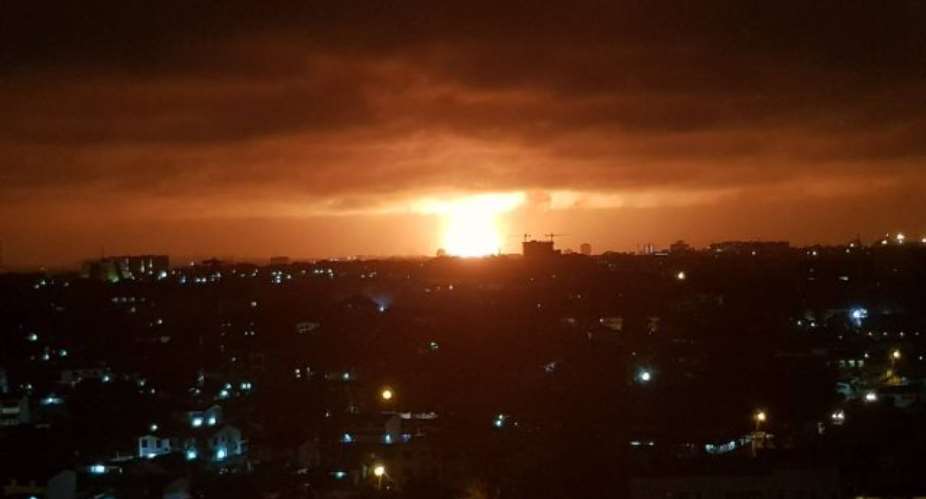October 7, 2017 is a day that will forever be etched in Ghana’s history. At around 6:30PM, a huge tanker discharging natural gas exploded causing a local filling station at Atomic Junction to detonate. The blast left seven dead and hundreds injured.
Its aftermath left governmental officials, the Fire Service and the National Petroleum Authority in a frenzy to prevent the tragedy from happening again.
Days after the blast, Vice President Mahamudu Bawumia announced that immediate modifications at filling stations would take effect and that “the NPA, Fire Service and government will work quite quickly to implement those policies.”
On the Super Morning Show Monday, Director of Inspections, Monitoring Health Safety, Security and the Environment for the NPA, Esther Anku, updated the public with how far the Authority has gone with the new policies.
Thus far, a new national liquefied petroleum gas policy through the cylinder recirculation model was implemented and designed to move gas bottling plants from populated areas to more isolated areas. This was done to safeguard Ghanaians from LPG that could pose hazards.
“Safety is a shared responsibility. Government and regulators have a role to play,” said Anku. “One of the key responsibilities of government is policy direction.”
Subsequently, the Ministry of Energy directed the NPA to guarantee that at least 50% of Ghanaians have access to environmentally-friendly LPG by 2030.
Read more: NPA briefs Council of State on cylinder recirculation
That process would include the creation of a market-driven structure that increases access to LPG and warrants the sustainability of supply among others.
A committee called the National LPG Policy Implementation Committee was established to ensure a smooth rollout of the process. The Committee developed a roadmap with four key objectives: regulatory framework, cylinder recall, training and capacity building and decommissioning of high risk refilling plants.
However decommissioning of high-risk refilling plants have not begun.
It is unclear when the decommissioning will begin, Anku said. But said that decommissioning would begin “when the first bottling plant is up.”
Meanwhile, the NPA has consulted with petroleum service providers including bulk distribution companies, storage companies, oil marketing companies, tanker drivers and LPG refilling plant operators to ensure smooth rollout of the process.
“Whilst we are hopeful the full implementation of the measures will ensure safety, the NPA, in the interim, is collaborating with the Oil Marketing Companies (OMCs) and other relevant stakeholder agencies, to enhance the capacity of persons involved in the handling of petroleum products, including tanker drivers and their mates,” an NPA statement reads.
“The NPA has also strengthened its capacity to intensify its monitoring and inspection mechanisms, to ensure safety standards at the various stations are rigorously enforced.”





 We’ll protect state wealth from opaque deals – Prof Jane Naana
We’ll protect state wealth from opaque deals – Prof Jane Naana
 Mauritania president says running for second term in June polls
Mauritania president says running for second term in June polls
 I won't ever say I was a mere driver’s mate' — Prof. Opoku-Agyemang
I won't ever say I was a mere driver’s mate' — Prof. Opoku-Agyemang
 2024 polls: 'EC struggling to defend credibility'— Prof. Opoku-Agyemang
2024 polls: 'EC struggling to defend credibility'— Prof. Opoku-Agyemang
 Akufo-Addo gov't's 'greed, unbridled arrogance, unrestrained impunity, sheer dis...
Akufo-Addo gov't's 'greed, unbridled arrogance, unrestrained impunity, sheer dis...
 Election 2024: Ghana needs an urgent reset, a leadership that is inspiring – Ma...
Election 2024: Ghana needs an urgent reset, a leadership that is inspiring – Ma...
 Partner NDC to rollout a future of limitless prospects – Prof Jane Naana Opoku-A...
Partner NDC to rollout a future of limitless prospects – Prof Jane Naana Opoku-A...
 NPP will remain in gov’t till Jesus comes — Diana Asamoah
NPP will remain in gov’t till Jesus comes — Diana Asamoah
 Sunyani Technical University demands apology from former SRC president over sex-...
Sunyani Technical University demands apology from former SRC president over sex-...
 'Dumsor' was resolved by Mahama but ‘incompetent' Akufo-Addo has destroyed the g...
'Dumsor' was resolved by Mahama but ‘incompetent' Akufo-Addo has destroyed the g...
